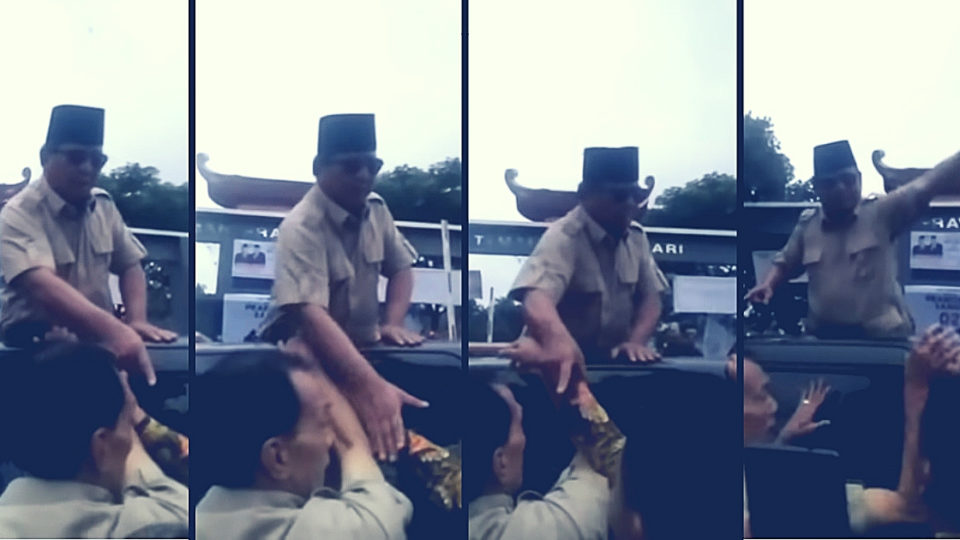The spokespeople for presidential candidate Prabowo Subianto have been having to explain a lot of their leader’s more outlandish behavior recently. But compared to his propensity for pulling off his shirt in public, spinning the former general’s angry outburst in a video that has gone viral since yesterday is probably going to prove a much harder task.
The incident took place around midday while Prabowo was making a campaign visit to Cianjur, West Java, yesterday. Videos of it were posted to Twitter by around noon and quickly went viral.
https://twitter.com/zoelfick/status/1105341376747601921
In the video, Prabowo, can be seen standing through his car’s sunroof as it drives past his supporters. Suddenly he flashes anger toward a man in a black and orange batik shirt, slapping at his arm, pointing his finger, angrily yelling and then finally grabbing his wrist to pull it off the car.
The brief burst of anger seemed, to some netizens at least, to show a crack in Prabowo’s campaigner facade revealing the severe former general beneath. But the Gerindra chairman’s campaigners are trying to spin it as an example of his fierce protectiveness towards the people.
The head of communications for Prabowo’s campaign, Dahnil Anzar Simanjuntak, took to Twitter to explain the incident.
Pak @prabowo bersama rakyat Cianjur.Beliau memperingkat dengan keras aparat pengaman yg berlebihan sampai mendorong emak2 yg ingin mendekati beliau. Aparat pengaman yg berbaju batik yg diperingatkan beliau pasti sadar betul kekeliruan dan peringatan Pak Prabowo tsb.Jd stop fitnah pic.twitter.com/U5zPdqMz5l
— Dahnil A Simanjuntak (@Dahnilanzar) March 12, 2019
While Pak @prabowo was with the people of Cianjur. He warned against the use of excessive force by security guards pushing back at the women who wanted to approach him. The security apparatus in batik had to realize the confusion and warnings of Pak Prabowo. So stop the slander.
Later, Danhil shared another video of the incident, taken from a different angle, in which Prabowo can be heard yelling “Jangan dorong rakyat” (Don’t push the people) at the man in the batik shirt.
"JANGAN DORONG RAKYAT". Kalimat yg diucapkan Pak @prabowo ktk menegur keras Aparat pengaman yg kasar dan mendorong2 rakyat yg ingin bersalaman dg beliau. Sementara, tim tukang fitnah dan hoax menyemburkan fitnahnya, dg keyakinan penuh tetap aman dari tindakan hukum. pic.twitter.com/brpuv7jFJM
— Dahnil A Simanjuntak (@Dahnilanzar) March 12, 2019
“DO NOT PUSH THE PEOPLE”. Those were the words spoken by Pak @ prabowo loudly to the abusive security officer who pushed the people who wanted to shake hands with him. Meanwhile, liars and hoax spreaders continue to spew this slander with full confidence but they are still safe from legal action.
Pretty soon, reposts of the video featuring the hashtag #JanganDorongRakyat were being Tweeted by pro-Prabowo accounts.
catetttt!#JanganDorongRakyat #JanganDorongRakyat #JanganDorongRakyat https://t.co/INJFSg05DY
— abhe syach (@abhesyach) March 12, 2019
While “Don’t Push The People” may sound like a good slogan for the gruff former general, considering the person Prabowo imperiously hit and yelled at was a member of his personal security detail sort of undercuts the sentiment.
The deputy director of Jokowi’s campaign, Daniel Johan, said that the security officer was only doing his job, which was to protect Prabowo at all costs, and said he was sure the rival candidate had forgiven the officer. He also noted that President Jokowi faced similar problems.
“Pak Jokowi also always emphasizes to Paspampres (his security team) to always understand and give space to enthusiastic people to shake hands with their idol president. Maybe the security forces of Pak Prabowo can learn from Mr Jokowi’s side,” Daniel said today as quoted by Detik.
It’s not yet clear what, if any, impact the incident will have on Prabowo’s electability, but with just about a month until the election on April 17, any more PR blunders (and he’s had plenty already) could be devastating as he’s already trailing behind the incumbent by double digits in the vast majority of polling.




